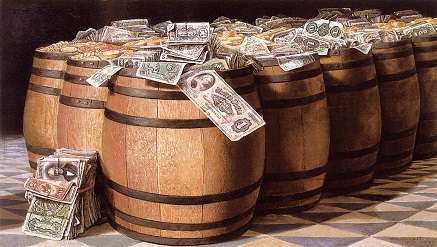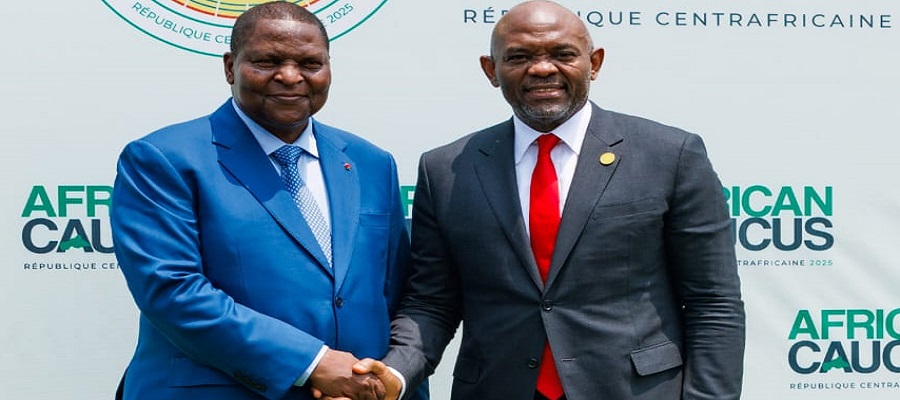General News
FG Begins Probes of N3.8trn Missing Oil Money

A panel of four governors was, yesterday, constituted to probe the affairs of the Nigerian National Petroleum Corporation (NNPC), following revelations that the corporation withheld N3.8 trillion of the N8.1 trillion generated from oil receipts.
Vanguard newspapers reported that the committee comprising governors of Gombe, Edo, Akwa Ibom and Kaduna states is also to unravel circumstances of the disappearance of another $2.1 billion which was allegedly unilaterally withdrawn by the Goodluck Jonathan administration in the last six months of its tenure.
The revelations came at the end of the inaugural meeting of the new National Economic Council, NEC, in Abuja, yesterday.
Just before the NEC meeting got underway, a senior official of the Goodluck Jonathan administration gave reasons why it passed over an empty treasury to the new government.
Prof. Sylvester Monye, who served as special adviser on monitoring and evaluation to President Jonathan, in an interview, also cautioned the new administration’s officials against sustaining the language of opposition while in office, saying that their continuing propaganda could negatively impact on the sound economic indicators transferred by Dr. Jonathan.
At the inauguration of the NEC, President Buhari cautioned the state governors to shore up their finances towards ensuring that they do not lag behind in their obligations. He also disclosed plans to channel G-7 funding for the rehabilitation of three states ravaged by Boko Haram.
President Buhari also pledged to adhere strictly to constitutional provisions on the maintenance of the Federation Account which stipulates that all funds from revenue generating agencies should be paid into the Federation Account.
Following the inaugural meeting of the NEC, Governor Oshiomhole accompanied by the Chairman of the Nigeria Governors’ Forum and Zamfara State Governor, Abdulaziz Yari; Kaduna State Governor, Mallam Nasir el-Rufai and Akwa Ibom State Governor, Mr. Udom Emmanuel briefed the press.
He disclosed that based on the reports presented by NNPC and officials of the office of the Accountant-General of the Federation to the NEC, it was discovered that a total of N3.8 trillion generated from oil revenues in the last three years was withheld by the NNPC.
Besides, he said that the Ministry of Finance unilaterally spent $2.1 billion from the Excess Crude Account without recourse to the governors between last November and May, 2015.
He said: “This is the first time we had a National Economic Council meeting in which under the instructions of the President, NNPC and the Office of the Accountant -General of the Federation were compelled to provide information in black and white on issues as it relates to the total sales of Nigerian crude from 2012 to May 2015. This has never happened before and for us this is profound.
“What we saw from those figures,which I believe Nigerians are entitled to know, is that whereas the NNPC claimed to have earned about N8.1 trillion, what NNPC paid into the Federation Account between 2012 and May, 2015 was N4.3 trillion and NNPC withheld and spent N3.8 trillion. We are talking about transparency, we are talking about change.
“What it means is that NNPC withheld and spent N3.8 trillion. The major revelation here is that the entire federation, that is the Federal Government, the states and all the 774 local governments, the amount the NNPC paid into the federation account for distribution to these three tiers of government came to N4.3 trillion and NNPC alone took and spent N3.8 trillion.
“Which means the cost of running NNPC is much more than the cost of running the Federal Government. That tells you how much is missing, what is mismanaged, what is stolen. These are huge figures.
“So if you were doing the right thning, you won’t have a situation where the NNPC alone will spend N3.8 trillion and remit to the federal, states and local governments N4.3 trillion which means NNPC is taking about 47 per cent and that explains all the leakages you are talking about.”
ECA withdrawals
On the withdrawals from the ECA, he said: “We looked at the figures for the Excess Crude Account, ECA, the last time the Minister of Finance and Co-ordinating Minister of the Economy, reported to the Council and it is in the minutes. She reported by November 2014, that we had $4.1 billion but today the Accountant-General’s Office reported that we have $2.0 billion, which means the Honourable Minister spent $2.1billion without authority of the NEC.
“That money was not distributed to states, it was not paid to the three tiers of government. This is why the NEC has set up a panel to look at what accrued, what it was spent for, when and by whom, so that Nigerians will have the full picture of all the transactions as regards the much talked about Excess Crude Account.”
Giving the mission of the four-man team to probe the NNPC, he said: “The four-man committee will check the books of NNPC most specially the issue of excess crude and what is not remitted into the Federation Account.
Governor Nasir El-Rufai of Kaduna State also speaking at the briefing said: “What we have seen in the last few months or years is that the Excess Crude Account was operated unilaterally by the Federal Government, drawings were made unilaterally without consulting those that actually own the money because the Excess Crude Account is 52 per cent owned by the federal government and 48 per cent by the states and LGAs.
“So the decision of the NEC is to set up this committee of four to look at the operations of the Excess Crude Account and make recommendations to council on its future.”
Earlier while inaugurating the NEC, President Buhari said: “The Federal Government will abide by the provisions of Sections 80 and 162 of the Constitution and ensure more accountability, transparency and integrity in the Distribution of the Federation Account. All revenue generating agencies such as Nigeria National Petroleum Corporation (NNPC), Nigeria Customs Services (NCS), Federal Inland Revenue Services (FIRS), Nigeria Ports Authority (NPA), Central Bank of Nigeria (CBN), Nigeria Maritime Administration and Safety Agency (NIMASA) and Liquefied Natural Gas (LNG) amongst others shall comply with stipulated Financial Regulations and Administrative Instructions in their remittances into the Consolidated Revenue Fund.”
The President’s assertion could mean the imminent abrogation of the Excess Crude Account, whose operation is currently the subject of litigation.
The President also unfolded plans to attract funding from the G7 countries for the rehabilitation of the three states of Borno, Yobe and Adamawa most affected by the Boko Haram insurgency.
“I have directed the frontline states of Borno, Yobe and Adamawa to articulate realistic assessments, costs, locations on Local Government by-Local-Government of affected facilities for submission to the President of the G7 for further verification. In addition, the requirements of the military have been prepared by the service chiefs for the consideration of the G7 Nations“, he said.
General News
Bank Staff Arraigned for Allegedly Defrauding Customer of N423m

Abiodun Maccarthy, former bank employee, has been arraigned before Justice Mojisola Dada of the Special Offences Court sitting in Ikeja, Lagos, over an alleged ₦423 million fraud involving a customer’s fixed deposit investment.

Maccarthy was brought before the court by the Economic and Financial Crimes Commission (EFCC) on Thursday, July 31, 2025.
He faces a four-count charge bordering on stealing and forgery, offences said to be in violation of Sections 278 and 361(1) of the Criminal Law of Lagos State, 2011.
According to a statement by Dele Oyewale, spokesperson, EFCC, the defendant allegedly converted ₦423 million out of a ₦650 million deposit made in 2018 by a client, Great Endurance Bureau De Change, for a fixed deposit investment.
The funds were reportedly diverted for his personal use while he was still in the bank’s employ.
To conceal the alleged fraud, Maccarthy was said to have forged a fixed deposit investment certificate bearing slip number 332540, which he issued to the client as proof of the transaction.
One of the counts reads: “Abiodun Maccarthy, sometime in 2018 at Lagos, within the jurisdiction of this Honourable Court, dishonestly converted to your own use the sum of ₦423,000,000.00 (Four Hundred and Twenty-Three Million Naira), money which forms part of ₦650,000,000.00 (Six Hundred and Fifty Million Naira) paid to you by Great Endurance Bureau De Change for fixed deposit investment while you were in the bank’s employ.”
Another count adds that he “with intent to defraud, forged a fixed deposit investment certificate with slip no. 332540 and issued same to Great Endurance Bureau De Change as evidence of investment.”
Maccarthy pleaded not guilty to all the charges.
Following his plea, B. M. Isah, prosecution counsel requested a trial date and urged the court to remand the defendant in a Correctional Centre.
Justice Dada granted the request and adjourned the case until October 22, 2025, while ordering that Maccarthy be remanded in custody.
General News
Tony Elumelu Lists 3 Things Africa must do to Bridge Infrastructure Gap

Tony Elumelu, group chairman of Heirs Holdings and UBA, has listed strengthening fiscal capacity, driving operational efficiency, and unlocking innovative financing as three key things Africa must do to truly rise and bridge its infrastructure gap.

L-r: Faustin-Archange Touadéra, president, Central African Republic; and Mr. Tony Elumelu, group chair, UBA and Heirs Holdings and Founder, Tony Elumelu Foundation.
Elumelu, also founder of The Tony Elumelu Foundation, urged Africa to enable the private sector to co-lead infrastructure development.
He stated all these in his keynote address at the African Caucus meeting held in Bangui, Central African Republic.
The meeting was themed, ‘Resilient Infrastructure, Human Capital, and Green Assets’.
Elumelu highlighted that across Africa, there is a deep and persistent infrastructure divide.
“From roads to ports, power to internet connectivity, we lag behind. We cannot achieve prosperity without the foundations of modern development. Without addressing these gaps, we cannot unlock the growth and prosperity our people deserve,” he said.
He emphasised that energy access is the most critical enabler or barrier to Africa’s progress, pointing out that up to 70% of Africans still lack access to electricity.
“My home country, Nigeria, generates less than 7,000 megawatts for over 200 million people.
“If we are to industrialise, create jobs, and participate meaningfully in the global AI revolution, we must invest aggressively in energy from renewables to cleaner gas-based solutions. Imagine what Nigeria’s economy could become with 100,000 megawatts of reliable, affordable energy. That is the scale of transformation we need”, he said.
Elumelu called for a stronger role for the private sector in infrastructure delivery, citing the work of Transcorp and Heirs Energies as an example of how private capital can address public challenges.
“We are generating power, exporting it through the West African Power Pool, and using gas from our oil operations to power our plants. This is Africapitalism in action,” he said.
Africapitalism, he explained, is the belief that Africa’s private sector must lead in driving economic transformation through long-term investments that generate both economic and social returns.
But for Africapitalism to succeed, he said, strong public-private partnerships are essential.
“Governments must create the right environment. The private sector must bring capital and innovation. And our development partners must support Africa’s realities – including recognising gas as a viable transition fuel on our path to clean energy”, he added.
On Africa’s human capital, Elumelu underscored that no resource is more valuable than the continent’s people especially its youth.
“Africa is the youngest continent on earth, with over 60% of our population under 35. This presents both our greatest asset or our greatest risk,” he said. “If empowered, our youth can transform Africa. If neglected, they can become a source of instability.”
Through the Tony Elumelu Foundation, he said, over 24,000 young entrepreneurs across all 54 African countries have been empowered with non-refundable seed capital of USD5,000 each.
The foundation has also trained 1.5 million youths and catalysed 1.2 million jobs. “These entrepreneurs are creating jobs, building businesses, and changing lives,” he noted.
To conclude his address, Elumelu delivered three powerful messages.
“Africa’s development is our responsibility. No one else will do it for us. Africa’s future is in our hands. No one will build this continent for us. We must lead,” he said. “Power is everything. No industrial revolution can happen without electricity. We must prioritise energy. Without power, there can be no progress.”
And finally, “We must invest in our youth. They are not just our future, they are our present.”
He commended the growing focus of global institutions on Africa, referencing his role on the IMF Advisory Council on Entrepreneurship and Growth and expressing optimism about the renewed emphasis on job creation as a path to sustainable development.
He also praised the World Bank’s ‘Mission 300’ initiative led by President Ajay Banga, which aims to connect 300 million Africans to electricity
“Africa is ready,” Elumelu declared. “Let’s seize this moment and build the prosperous, empowered continent our people deserve”.
General News
Babcock VC Unveils New Horizons’ N1.5Bn ICT Centre

Prof. Ademola Tayo, the Vice Chancellor, Babcock University, has unveiled a 2,000-seater capacity ICT Centre, built and equipped with modern ICT facilities by New Horizons, a foremost ICT Training Institute.

The three-storey building has six classrooms in each floor that can accommodate a minimum of 50 students in a class, including seat-outs, offices and halls that are fully equipped with flat-screen computers and modern ICT facilities that cut across Artificial Intelligence (AI), Robotics, Internet of Things (IoTs), among others.
Speaking at the unveiling, which marks part of the university’s 23rd convocation activities, the Vice Chancellor thanked New Horizons for the donation of the facility to the university community, which he said, would boost learning of new ICT skills, including AI.
“The university has been in collaboration with New Horizons for the training of our students in ICT certification courses. The reason why our students are doing very well in their studies is because of the digital literacy skills that New Horizon is offering our students. Every student from level-one takes ICT certification courses offered by New Horizon and that has helped the students to excel in their studies,” the Vice Chancellor said.
Mr. Tim Akano, CEO, New Horizons Nigeria, said: “We are not unveiling the building alone. We are also unveiling the resources inside the building. We brought in customized all-in-one systems, including some equipment for Robotics and AI. We also made provision for a garden and we are dedicating the garden to the five principal officers of the university. Each of them will plant a symbolic lemon tree that signifies health, prosperity, fidelity, cleansing, longevity, protection and love.”

 Telecom3 days ago
Telecom3 days agoMTN Mulls AI Tech to Protect Infrastructure as Cable Cuts Hit 13,000 in 18 Months

 E-Financial2 days ago
E-Financial2 days agoEcobank Sends Important Notice for Customers

 E-Financial3 days ago
E-Financial3 days agoBanks Reopen Naira Card Payments for International Tuition Fees

 News3 days ago
News3 days agoYahoo Mail Halts Free Storage Service, Caps at 20GB

 E-Financial3 days ago
E-Financial3 days agoSafaricom, PayPal Collaborate to Link Mobile Money with Online Payments

 Broadcasting3 days ago
Broadcasting3 days agoHow AI Agents Will Revolutionise Industries, Boost Productivity, and Cut Costs

 News3 days ago
News3 days agoCAC to Delist 100,000 Dormant Firms After 90-Day Compliance Window

 E-Business3 days ago
E-Business3 days agoAttackers Target Employees with Fake HR Updates

























